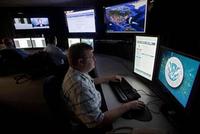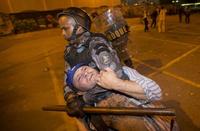-
NSA, FBI monitored e-mails of prominent Muslim American leaders, attorneys
The NSA and FBI monitored the e-mails of prominent Muslim American leaders and attorneys, including the head of the largest American Muslim civil rights group, The Intercept reported yesterday. Critics of the surveillance programs of the NSA and other government agencies said the revelations proved their contention that these programs should be more closely monitored. The critics say that in order to obtain FISA court approval for the surveillance, the government alleged that these activists were agents of foreign powers. The critics also note that the monitoring of lawyers’ e-mails raises concerns that some of the information collected may be protected by the attorney-client privilege, which the intelligence agencies are bound to respect.
-
-
Supreme Court cites NIST guidelines in ruling on cell phone searches
As digital technology transforms twenty-first century life, questions about privacy rights abound. The U.S. Supreme Court ruled on one such question in late June: if you are arrested, can the police search your cell phone without first obtaining a warrant? No, according to the 25 June 2014 ruling in Riley v. California. “Modern cell phones are not just another technological convenience. With all they contain and all they may reveal, they hold for many Americans ‘the privacies of life,’ … The fact that technology now allows an individual to carry such information in his hand does not make the information any less worthy of the protection for which the Founders fought,” Chief Justice John Roberts wrote for the majority.
-
-
License plate readers still to reach their full potential
Systems which automatically read automobile license plates have the potential to save police investigative time and increase safety, but law enforcement officials must address issues related to staffing, compatibility and privacy before the technology can reach its full potential, according to a new study. Addressing these issues will require a clear understanding of the current and potential value of the systems to criminal justice agencies.
-
-
NSA shelved collection program which could have prevented 9/11 attacks: Critics
Fourteen years ago the NSA research unit developed a collection program called Thin Thread which, its authors say, could have detected the perpetrators of the 9/11 attacks and prevented it. Critics of the program agreed it was a good program, but that it picked up more Americans than the other systemsthen being considered, and was thus deemed too invasive of Americans’ privacy. In the fall of 2000 General Michael Hayden, then-director of the NSA, decided against the program largely because of the legal implications.
-
-
Leaked documents reveal law enforcement hacking methods

Through the sourcing of a leaked documents cache from the Italian firm Hacking Team, members of the University of Toronto’s Citizen Lab have revealed the methods of law-enforcement hackers. While much of Snowden’s revelations concerned broad international surveillance, documents from Hacking Team reveal more specific methods such as the actual techniques for tapping phones and computers to operate as eavesdropping devices.
-
-
Privacy advocates worried about new Senate cybersecurity bill
Privacy groups are concerned that a new Senate cybersecurity bill could give the NSA unrestricted access to personal information of Americans. The Cybersecurity Information Sharing Act (CISA), a counterpart to the Cyber Intelligence Sharing and Protection Act (CISPA) which passed the House in 2013, would create a “gaping loophole in existing privacy law,” several privacy advocacy groups wrote in a letter to lawmakers.
-
-
Judge rules use of NSA surveillance-based information in terrorist case is legal
Lawyers for Mohamed Mohamud, a U.S. citizen who lived in Oregon, have been denied a motion to dismiss his terrorism conviction, with the court affirming the legality of the U.S. government’s bulk phone and e-mail data collection of foreign nationals living overseas. Mohamud’s defense team claimed the surveillance violated his constitutional rights, and that federal prosecutors did not make available to the defense evidence obtained via the surveillance. U.S. District Judge Garr King upheld Mohamud’s conviction, saying that suppressing the evidence collected through NSA surveillance “and a new trial would put defendant in the same position he would have been in if the government notified him of the (surveillance) at the start of the case.”
-
-
Pentagon’s excess equipment makes local police resemble military units
In the early 1990s, Congress authorized the Pentagon to transfer excess military equipment to law enforcement agencies across the country for use in counter-drug activities. Since the program’s inception, the Pentagon has transferred $4.3 billion worth of military equipment to local and state agencies. In 2013 alone, $449,309,003 worth of military property was transferred to law enforcement. Critics say that more and more police departments now resemble military units, and that military gear is used in cases where it should not – as was the case in a small Florida town in 2010, when officers in SWAT gear drew out their guns on raids on barbershops that mostly led to charges of “barbering without a license.”
-
-
World Cup security teams focus more on crime, protests – less on terrorism

During the 2014 FIFA World Cup, currently being held across twelve different venues across Brazil, security teams have extensively prepared for measures to be taken against crime and protest related to heated political unrest. American bomb-busting robots, Israeli surveillance drones, and German anti-aircraft tanks — an international assortment of security officials and measures – are just some of the pieces of the greater security apparatus protecting both players and fans.
-
-
New generation of aerial robots for high-risk missions
The need for robots able to carry out high-risk service tasks, such as the inspection of power plants and the cleaning of skyscrapers, is growing. Robots which actively interact with the environment without being constrained on the ground are well suited to such tasks.
-
-
Defense in terror case challenges exclusion from court session on surveillance records
The defense for Adel Daoud, a young Muslim man who was arrested outside a Chicago bar in an undercover FBI operation and charged with attempting to blow up the bar, has submitted a motion objecting to a private court session held to discuss the defense’s access to classified records. “Not only do I not get to be there, but I didn’t even get to object,” defense attorney Thomas Durkin said. “I had to object over the fact that I couldn’t even make an objection.”
-
-
Improved performance of facial recognition software
Who is that stranger in your social media photo? A click on the face reveals the name in seconds, almost as soon as you can identify your best friend. While that handy app is not quite ready for your smart phone, researchers are racing to develop reliable methods to match one person’s photo from millions of images for a variety of applications.
-
-
NSA, other agencies, collect millions of images for large facial recognition databases
The NSA, through its global surveillance operations, has been accumulating millions of images from communication interceptions for use in high-level facial recognition programs, according to classified 2011 documents leaked by Edward Snowden. The documents do not reveal how many people have been targeted with facial recognition programs, but given the NSA’s foreign intelligence mission, a bulk of the imagery collected would involve foreign nationals.
-
-
Nature-inspired designs for drones of the future

Based on the mechanisms adopted by birds, bats, insects, and snakes, fourteen research teams have developed solutions to some of the common problems that drones could be faced with when navigating through an urban environment and performing novel tasks for the benefit of society. Whether this is avoiding obstacles, picking up and delivering items, or improving the take-off and landing on tricky surfaces, it is hoped the solutions can lead to the deployment of drones in complex urban environments in a number of different ways, from military surveillance and search and rescue efforts to flying camera phones and reliable courier services.
-
-
Snowden revelations spur a surge in encrypted e-mail services
The Edward Snowden revelations about National Security Agency(N.S.A) surveillance programs have fueled a surge of new e-mail encryption services. “A lot of people were upset with those revelations, and that coalesced into this effort,” said the co-developer of a new encrypted e-mail service which launched last Friday. The company notes that its servers are based in Switzerland, making it more difficult for U.S. law enforcement to reach them.
-
- All
- Regional
- Water
- Biometrics
- Borders/Immig
- Business
- Cybersecurity
- Detection
- Disasters
- Government
- Infrastructure
- International
- Public health
- Public Safety
- Communication interoperabillity
- Emergency services
- Emergency medical services
- Fire
- First response
- IEDs
- Law Enforcement
- Law Enforcement Technology
- Military technology
- Nonlethal weapons
- Nuclear weapons
- Personal protection equipment
- Police
- Notification /alert systems
- Situational awareness
- Weapons systems
- Sci-Tech
- Sector Reports
- Surveillance
- Transportation
Advertising & Marketing: advertise@newswirepubs.com
Editorial: editor@newswirepubs.com
General: info@newswirepubs.com
2010-2011 © News Wire Publications, LLC News Wire Publications, LLC
220 Old Country Road | Suite 200 | Mineola | New York | 11501
Permissions and Policies
Editorial: editor@newswirepubs.com
General: info@newswirepubs.com
2010-2011 © News Wire Publications, LLC News Wire Publications, LLC
220 Old Country Road | Suite 200 | Mineola | New York | 11501
Permissions and Policies
